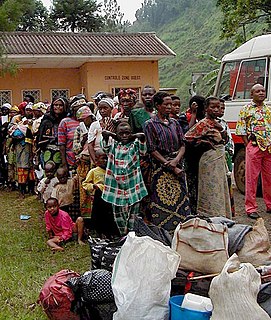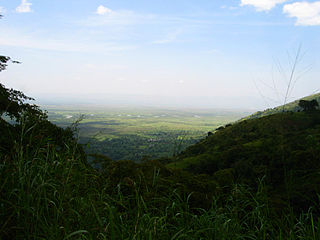
Ground transport in the Democratic Republic of the Congo (DRC) has always been difficult. The terrain and climate of the Congo Basin present serious barriers to road and rail construction, and the distances are enormous across this vast country. Furthermore, chronic economic mismanagement and internal conflict has led to serious under-investment over many years.

Lake Mwitanzige, also Albert and formerly Lake Mobutu Sese Seko, is a lake located in Uganda and the Democratic Republic of the Congo. It is Africa's seventh-largest lake, as well as the second biggest of Uganda's Great Lakes.

The Second Congo War began in the Democratic Republic of the Congo in August 1998, little more than a year after the First Congo War, and involved some of the same issues. The war officially ended in July 2003, when the Transitional Government of the Democratic Republic of the Congo took power. Although a peace agreement was signed in 2002, violence has continued in many regions of the country, especially in the east. Hostilities have continued since the ongoing Lord's Resistance Army insurgency, and the Kivu and Ituri conflicts.

The Allied Democratic Forces is a rebel group in Uganda and the Democratic Republic of the Congo (DRC), considered a terrorist organisation by the Ugandan government. It was originally based in western Uganda but has expanded into the neighbouring DRC.

The Ituri conflict is a major conflict between the agriculturalist Lendu and pastoralist Hema ethnic groups in the Ituri region of the north-eastern Democratic Republic of the Congo (DRC). While the two groups had fought since as early as 1972, the name 'Ituri conflict' refers to the period of intense violence between 1999 and 2003. Armed conflict continues to the present day.

Semliki River is a major river, 140 kilometres (87 mi) long, in the Democratic Republic of the Congo (DRC) and Uganda in Central and East Africa. It flows north from Lake Edward to Lake Albert in the Albertine Rift west of the Rwenzori Mountains. Along its lower reaches, it forms part of the international border between the DRC and the western Ugandan district of Bundibugyo, near the Semuliki National Park. It empties into Lake Albert slightly west of the border in Orientale Province of the DRC.

On 15 April 2008, Hewa Bora Airways Flight 122, a McDonnell Douglas DC-9-51 plane crashed into a residential and market area of Goma of the Democratic Republic of the Congo immediately south of Goma International Airport.
The Amba are a people located in border area of the Democratic Republic of the Congo and Uganda south of Lake Albert in the northern foothills of the Rwenzori Mountains. On the Uganda side, they are found in Bundibugyo District. On the Congolese side, they are located in the Watalinga and Bawisa subcounties of Beni, South Kivu. Numbering 42,559 on the Uganda side in the 2014 census and 4,500 on the Congolese side according to a 1991 SIL International estimate, Ethnologue lists their total population as 40,100. Agriculturalists, the Amba traditionally cultivate plantains, millet, maize, sweet potatoes, peanuts, rice, coffee, cotton, and cassava, while raising goats and sheep. The Amba practice Christianity.

The Thekkady boat disaster occurred on 30 September 2009, when the double-decker passenger boat Jalakanyaka sank in Lake Thekkady, Periyar National Park, Kerala, India. When the boat capsized, 45 tourists died, most of them from Delhi and Kolkata. A total of 82 people were on the boat. The boat's helmsman, Victor Samuel, and another crew member were arrested on 5 October.
On 29 July 2010, an overloaded passenger ferry capsized on the Kasai River in Bandundu province, east of Kinshasa, in the Democratic Republic of the Congo. At least 80 people were confirmed to have died, with other accounts putting this figure closer to 140.

The 1966 Toro earthquake, or the 1966 Ruwenzori earthquake, occurred on March 20 at 01:42 UTC. The earthquake was located near the border between Uganda and the Democratic Republic of the Congo (DRC), to the south of Lake Albert. Some sources put the epicenter in Uganda while some put it in the Democratic Republic of the Congo. The earthquake had a magnitude of 6.8 and a maximum perceived intensity of VIII (Severe) on the Mercalli intensity scale.

The Allied Democratic Forces insurgency is an ongoing conflict waged by the Allied Democratic Forces in Uganda and the Democratic Republic of the Congo, against the governments of those two countries. The insurgency began in 1995, intensifying in 2013, resulting in hundreds of deaths. The ADF is known to currently control a number of hidden camps which are home to about 2,000 people; in these camps, the ADF operates as proto-state with "an internal security service, a prison, health clinics, and an orphanage" as well as schools for boys and girls.

The National Navy is the maritime component of the Armed Forces of the Democratic Republic of Congo (FARDC). It is a brown-water navy, which is currently commanded by Vice Admiral Rombault Mbuayama Nsiona.
The following lists events that happened during 2014 in the Democratic Republic of the Congo.

Kyangwali Refugee Settlement is a refugee camp in Kikuube District in western Uganda.

MV Nyerere is a Tanzanian ferry that capsized on 20 September 2018 while travelling between the islands of Ukerewe and Ukara on Lake Victoria. The Tanzanian government have declared that 228 people died as a result of the capsizing while 41 could be rescued. The capsized ferry was successfully righted, retrieved and unloaded more than one week after the disaster.

Massacres of Hutus during the First Congo War refers to the mass killing of Rwandan, Congolese, and Burundian Hutu men, women, and children in villages and refugee camps then hunted down while fleeing across the territory of Democratic Republic of Congo from October 1996 to May 1997.
Events in the year 2020 in Uganda.














